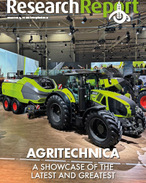This article is 2 years old. Images might not display.
With a record 2022 harvest including a 26 million tonne grain crop in WA, an abundance of food available in paddocks may contribute to further mouse pressures in 2023.
CSIRO rodent expert, Steve Henry, who is one of the lead researchers on the Grains Research and Development Corporation (GRDC)-supported investment into mouse management, says that conditions were ripe for mouse breeding this time of year.
Henry encouraged growers to monitor their paddocks throughout autumn, taking steps to reduce sources of available food.
"It is imperative growers get out of their vehicles, walk into their paddocks and get a good feel for what is going on in respect to current mouse numbers and activity," he said.
"Even if you think your paddocks are clean, remember only 150 kilograms per hectare of alternative food across your paddock equates to 50,000 mouse days of food."
"Be aware of any paddocks that may have incurred hail damage or head loss, especially in barley, as there may be excess grain on the ground, which mice will hunt out. If you notice evidence of mouse activity, be prepared to bait at seeding time."
The GRDC and the CSIRO recommend the application of zinc phosphide bait, which is the only rodenticide active ingredient registered for use in broadacre cropping in Australia.
Grain growers can access online stewardship training and reporting programs from Grain Producers Australia that have been introduced to support best practice application of ZP50 mouse bait products here: https://bit.ly/3V95LuY
In addition to completing the stewardship training, Henry advised growers to speak with bait manufacturers and resellers early, as bait can be in high demand once mouse plagues break out.
Tips for mouse management heading into seeding include:
• prioritising your paddocks for surveillance by choosing paddocks that have had heavy stubbles or grain loss;
• getting out of the ute and walking your paddocks and doing your surveillance 4-6 weeks before sowing;
• talking to your bait suppliers early if there is evidence of high mouse numbers; and
• ensuring you complete the required training for ZP50 mouse bait application.
GRDC has invested significantly in mouse monitoring and management and is committed to helping growers increase their preparedness for mouse outbreaks and the effectiveness of baiting.
As part of this commitment, GRDC has launched a new investment into mouse bait spreading, which aims to give growers resources and information to improve their bait spreading operations and reduce crop losses.
Project lead and research engineer for the Kondinin Group, Ben White, said little work had been done in Australia to date looking at mouse bait distribution uniformity and bait integrity using different spreading equipment.
Growers are encouraged to use GRDC's Mouse Management resources (https://bit.ly/3EfpXo8) to assist them in the lead up to seeding, including downloadable mouse chew cards for monitoring.























